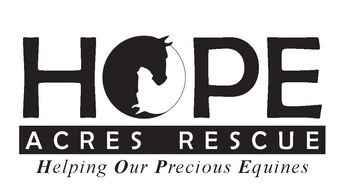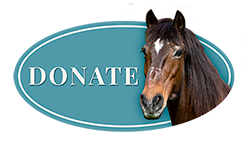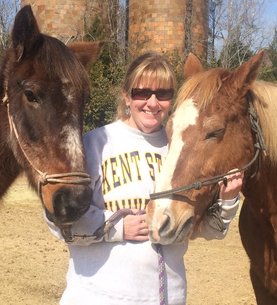Part of our mission is to find our rescues suitable loving, healthy, forever homes. This allows us to offer these precious animals a life of love and happiness and then go on to help another horse in need. We would love to talk to you about your experience and interests regarding horse ownership.
To adopt, H.O.P.E. Acres Rescue requires:
For more information, please read through our entire adoption application, which can be downloaded via the link below, or click the contact button to email our adoption coordinator, Becky Strong.
If you are new to horse ownership, please see the information below regarding the customary costs of owning a horse. We want to ensure that you, as a prospective adoptive family, are prepared and completely understand both the financial and physical demands that accompany horse ownership. We have compiled information for your review that you should take into careful consideration when thinking about the adoption of a horse.
To adopt, H.O.P.E. Acres Rescue requires:
- a farm visit
- a farrier, a vet, and at least 2 references
- at least one other horse at the adoptive home
- a minimum of 2 acres of pasture space
- a donation to the rescue (varies from companion horse to rideable equines)
For more information, please read through our entire adoption application, which can be downloaded via the link below, or click the contact button to email our adoption coordinator, Becky Strong.
If you are new to horse ownership, please see the information below regarding the customary costs of owning a horse. We want to ensure that you, as a prospective adoptive family, are prepared and completely understand both the financial and physical demands that accompany horse ownership. We have compiled information for your review that you should take into careful consideration when thinking about the adoption of a horse.
Photo Above: Solomon, adopted in 2020, with his new family.
Thank you for your interest!
Customary Expenses Of Horse Ownership
Dollar amounts shown are merely estimates and will vary based on your choice of brand, your horse's needs, veterinarian's recommendations and your farm's geographic location. The initial cost of purchasing a horse is usually palatable, but the least of expenses. Consider the below over the lifespan of a horse to get a better idea of the long-term financial responsibility of ownership.
Feed - (daily)
Water - (daily)
Hay - (daily or seasonally)
Supplements - (varies)
Vaccinations - (annually or seasonally)
Farrier - (every 6-8 weeks)
Worming - (every 6-8 weeks)
Water - (daily)
Hay - (daily or seasonally)
Supplements - (varies)
Vaccinations - (annually or seasonally)
Farrier - (every 6-8 weeks)
Worming - (every 6-8 weeks)
While these costs vary depending on brands used, horses individual medical needs and location of your farm or boarding facility, you can expect an average of $175.00/mo. or $2,100.00/yr. to maintain daily care of your horse.
Additional Costs
- Boarding - If you plan to board your horse at a facility, you can expect to pay a monthly boarding fee which could range from $200 - $2,000/mo. depending on the level of boarding and services offered at the stable, pasture board vs stall board, turn-out, feeding, supplements, etc. Call around to various stables, talk to others in the horse community for references and ask questions so that you know exactly what your fees include and the care your horse will receive.
- Farm Upkeep - If you intend for your new equine family member to live on your property, you will need to take into consideration your property upkeep, installation of run-ins or stalls, purchase of water trough, gate, horse-safe/sturdy fencing and maintenance of pasture grass for optimal nutrition for your horse. Every horse should ideally have 2 acres to allow grazing and room for sufficient exercising.
- Tack - This cost will vary based on the degree of wear and tear on the items you purchase, but you will initially have to purchase a halter, lead rope and grooming supplies at minimum.
- Owner Cost - If you plan to ride your horse it will be necessary for you to acquire proper safety equipment to ensure optimal riding pleasure for you and your horse. These items include boots, safety helmet, saddle pad, saddle, bridle, bit, reins and girth. You may also be inclined, if showing, to purchase additional clothing items to include riding pants, shirts, and jackets; again all depending on your riding style. While it is not necessary to purchase the most expensive equipment, you can expect several hundred dollars in cost even if your equipment is used.
- Training - It is a rather sad truth that horses that come into a rescue situation also come with a past. Some we have details on and others we learn as we get to know the animal. We have found that both mishandling and a lack of handling contribute to rather tethered dispositions. It has been our priority to implement a training program for our horses to the extent that we gain a better understanding of each horse's exposure, ability and talents. Having stated that, we encourage and strongly advise those who adopt to enlist the assistance of a qualified, experienced trainer to continue working with the horse and the owner to help them both work through any misguided handling or trauma that the animal may have experienced prior to its rescue. This training could range from $50/hr – $600/mo or more depending on your selected trainer and the extent to which you and your horse require assistance.
- Medical Care - Are you prepared for an emergency? If your horse has a medical emergency at your farm do you have the means to transport your horse to the veterinarian? A trailer can run between $1,000.00 used to upwards of $70,000.00 or more new, depending on its size and towing ability. If you do not own suitable transportation you can expect to pay emergency fees on top of customary veterinary expenses for the doctor to come out to your farm. These fees start in the low hundreds.
- Longevity - Horses can live into their thirties or longer depending on their lifestyle and overall health. Are you willing to make the lifelong commitment to provide, care for and tend to a horse for its lifespan? We ask that you carefully consider that responsibility. In an effort to maintain contact with our adoptive families, our rescues and to minimize future neglect we do not permit our adopted horses to be given away, sold, bred or traded.
|
H.O.P.E. Acres Rescue
P.O. Box 2037 Goose Creek, SC 29445 (843) 412-3519 |
|
(c) Copyright 2018 H.O.P.E Acres Rescue | All Rights Reserved
Proudly powered by Weebly







